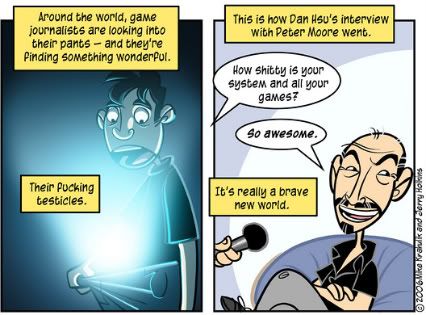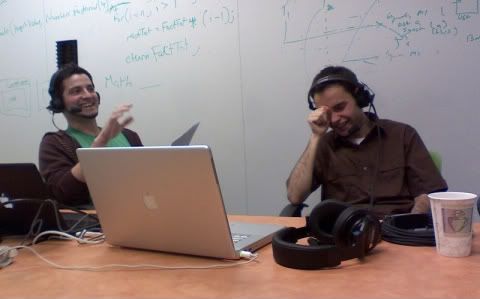 Through the last 20-odd years, we, the gamers, have grown a fondness for not just internet celebrities, but also gaming celebrities. Developers mostly, but I’m sure someone out in the great beyond celebrates the successes of pro gamers, much to their fellow gamers chagrin.
Through the last 20-odd years, we, the gamers, have grown a fondness for not just internet celebrities, but also gaming celebrities. Developers mostly, but I’m sure someone out in the great beyond celebrates the successes of pro gamers, much to their fellow gamers chagrin.
From the early days of game media, it wasn’t out of the norm for a magazine to have an entire section dedicated specifically to the editors of that particular book. Game Players was just as much about personality as it was games, and that formula paid off until the publication’s demise in 1998.
Games are supposed to be hobbies. They are intended to be fun and cater to an audience that isn’t always known for their maturity. Would a magazine that read and felt like the Globe and Mail penetrate this niche market?

Dan Hsu, co-founder of the revered website, Bitmob, became a journalistic celebrity because of his somewhat cavalier attitude and honest love for his craft. Strip by Penny Arcade
Thankfully, there was at least one publication that prided itself on being a more mature read– EGM. Former editor-in-chief, Dan Hsu was, and forever will be, a man committed to approaching game journalism with the same fervour of an international war reporter. Hsu gained even more notoriety after launching an attack against several competing and unnamed publications for their alleged “money hats.”
As magazine’s slowly died off, (or, in general, became less relevant thanks to the immediacy of the internet) writers, editors, and reporters became more shadowy figures than anything else. There seemed to be less room for personality because there were so many articles being posted from all corners of the globe that had no faces attached to them. It seemed that for a time, the internet was lauded for its anonymity.
Journalism took on an entirely new angle with the advent of the podcast in the late 90′s. Gamers, being a particularly technology savvy clique, jumped on the chance to have their news spoken to them on a weekly basis. Humorously, receiving your gaming news an entire week late was exactly what the internet wasn’t about, however, podcasts flourish.
Why is that? In an era where the public has grown to expect everything handed to them immediately after the press release is issued, why are we suddenly willing to take a week’s vacation? To quote Spock, this practice seems “Highly illogical.”
Most successful podcasts have a formulaic approach: introductions to the cast, the latest news, reviews, a feature or prudent news topic discussed in-depth by the hosts expressing their professional opinions, and finally, reader interaction, which is typically reader emails, or phone calls. Gamespot’s The Hot Spot popularized the idea of a “Homework Challenge,” which usually revolves around the shows host, Brendan Sinclair, asking listeners to participate in a usually humorous activity which might be read on air if it incites the proper amounts of hilarity.
These days, it seems that everyone is busy commuting to work, exercising, partying, or committing a crime, so let’s face it; the modern humanoid needs to multi-task. For the longest time, I believed that the only reason I listened to so many podcasts was because of my lengthy commute to and from work, and then while I sat at work. It was a good way to pass time, and I needed something to keep my mind active and attentive so I wouldn’t doze off, switch lanes, and consequently be involved with a roadside fatality. It turns out that since moving substantially closer to my office, I find myself tuning in just as often as before.
“Well, maybe it’s the humour aspect of it all,” I began to think.

From L to R: Daemon Hatfield and David Clayman. Most of IGN's gaming podcasts resemble an issue of Game Players magazine. Often informative, always welcoming.
I’ve listened to enough game-related podcasts to know which ones often get off topic, and which ones tend to keep it more formal. Each are good, but for different occasions. For a nearly indefinable reason, the Three Red Lights podcast from IGN is prone to getting off topic to chat about 80′s TV programs for an hour straight. It isn’t why I started listening to the cast originally, but it has managed to hook me to this very day.
Comedy aside, I began to revere the rather laissez-faire attitude shown by many who sat around the podcasting table. IGN, 1Up, Gamespot, and to a lesser extent, Kotaku, all seem to have panels that really let you enter their world and hang out with like-minded individuals. It ends up being a couple of folk hanging out with one another, and because we all came from similar backgrounds of pop culture, you feel right at home, and as if these were the people you grew up with.
Fortunately, I was born and raised around a handful of hardcore gaming enthusiasts, and collectively, we even began to publish our own podcast titled Level 2 (there is over 10 hours of mediocre material thus far). Many gamers, however, are not afforded such a luxury. While the industry is forever expanding and reaching new audiences, today though, it is still a niche topic. Maybe 1 in 10 people are gamers. That’s a high ratio, but it still means most people have no outlet of their own, excluding internet forums, which might not cut it for everyone. You might want a more humanized experience.
Many people don’t have gaming compatriots, but just as many people don’t have the time to socialize these days either. Going beyond podcasts filling a void in your gaming life, perhaps a gamer doesn’t have many friends, or social opportunities. Many professional game journalists have open Twitter feeds and Facebook pages. The number of people befriending or following someone so low on the gaming totem pole is incredibly weird. From what I have surmised, most journalists seem to try to run their personal pages the way you and I might do so; as in: giving our friends the details of our night via open comments exposed to everyone. The difference being that many of these business professionals receive inane replies or messages back from their legions of followers who expect, for instance, IGN’s Daemon Hatfield, to share the same sort of sentiment back that the public lavishes him with. If Hatfield posts pictures of his bathroom, he is absolutely going to receive 30 or more replies about it from people showing some sort of general concern because they feel like the really know him by hearing his voice for an hour each week.
What listener’s fail to recognize, is that they listen to him, and not the other way around. Hatfield has no idea who his audience really is. There is no way he could ever meet all of his so-called “Super Fans,” and even if he could, at the end of the day, he’s just a journalist. He isn’t Robert Pattinson. He doesn’t have to build up a good rapport with the public because as long as he continues to write and host, he will always find himself employed. One bad move by Pattinson, and suddenly he’s the world’s most hated glam-rock vampire.
I’ve been mulling this topic for over a year now, and I cannot draw a conclusion. Maybe podcasts are so popular among gamers because at heart, we’re all too lazy to read. Maybe it is for the humour, or maybe it’s for the void they can fill and you haven’t even realized it yet.
These are just observations and theory, of course. I want to know why you enjoy podcasts, what you are listening to, where do you listen to it, and any other information you might be keen to share. Maybe you were even adventurous enough to create your own podcast. Whatever you want to discuss, we at Critical Gamer want to hear it all.

















Comments